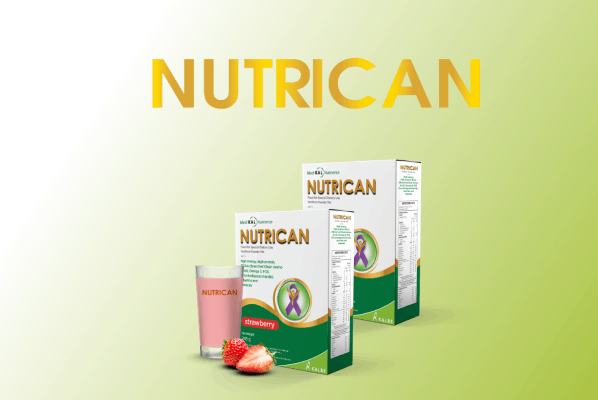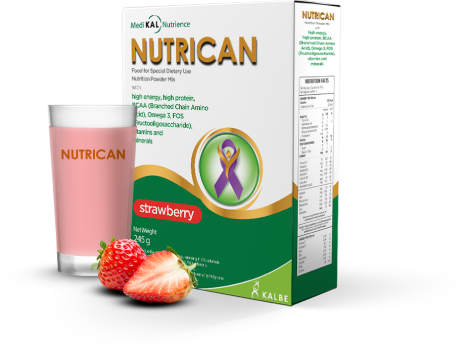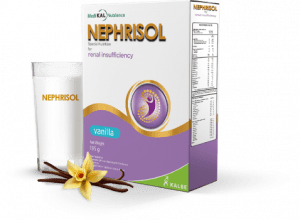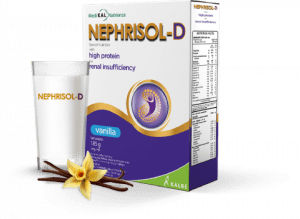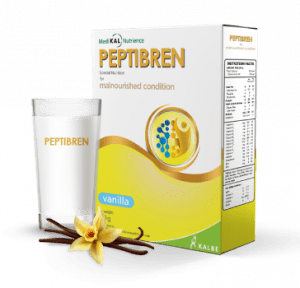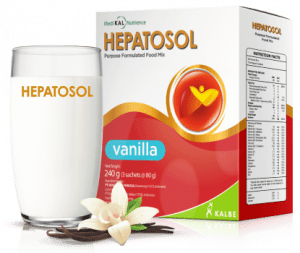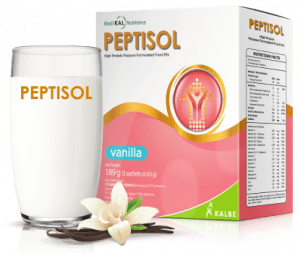Can Nutrican® be given to patients with DM?
Nutrican® can be given to DM patients. Because of its high energy content, regular blood glucose levels are recommended to be monitored, especially for DM patients receiving insulin therapy.
In COPD patients, the calories are too high. Nutrition is usually used with a calorie concentration of 1 kcal/mL, because if it is too high it will increase CO2 as a result of metabolism. Can Nutrican® be used and how to deal with it?
If, lower total energy is needed, Nutrican® can be given as much as 3 measuring spoons (from the recommended 6 measuring spoons) in 100ml of water or more. So, the total calorie intake would be lower.
Can Nutrican® be given to pregnant women?
Because Nutrican® contains nutrients that are normally obtained every-day and are not contraindicated for pregnant women, Nutrican® can be given; if, needed.
How Nutrican® be given to patients with impaired liver function? can it be given? because the fat content is quite high.
Special attention needed; especially for patients with impaired kidney function, where protein intake needs to be limited. But for patients with impaired liver function, Nutrican® can be given with the supervision of a nutritionist.
In cancer patients there is a protein breakdown and the results can cause the patient to vomit. Are there studies on Nutrican®‘s content increasing nausea and vomiting?
Nutrican® content does not cause nausea, vomiting in cancer patients. However, the lactose content which, although low; even; low lactose, may cause diarrhoea in a small proportion of patients who experience severe lactose intolerance.
Can Nutrican® be given to children?
Composition of Nutrican® is not suitable for paediatric patients. Our general recommendation is to be used for persons over 17 years of age. But if, it is needed, the need can be calculated and adjusted for Nutrican® intake.
If, given to children, for an example; half the recommended dose, are there any harmful components?
There are no harmful components or contraindications to give to children.
What are the advantages of Nutrican® so that the taste can be accepted by patients?
Nutrican® is present in a strawberry flavour so as to minimise the fishy odour of omega 3 obtained from fish oil. In addition, omega 3 content which is sufficient, in the sense it’s not too high, also helps improve the taste of Nutrican®, and help in getting it also more acceptable to patients who suffer from dysgeusia. The pronounced flavour will improve patient compliance.
If, a patient who consumes Nutrican® after few days’ patient suffer from diarrhoea. What ingredients would be the reason?
If, diarrhoea is caused by Nutrican®, it is likely it’s due to lactose content. Actually, Nutrican® is classified as low-lactose milk so that it can even be given to patients with lactose intolerance. But for patients with severe lactose intolerance, diarrhoea may occur.
What content in Nutrican® causes special attention for sufferers of kidney and liver function?
The high protein content of Nutrican® up to 95% RDA is of particular concern for sufferers of severe kidney and liver dysfunction. Nutrican® can be given by taking into account the limits of daily protein intake to avoid increasing blood urea / ammonium levels. Taking that in to account Nutrican® can be given to the patient as the medical practitioner seem fit.
If, the diagnosis is a benign tumour. Can Nutrican® be consumed too?
Maybe, but not necessarily. This is individualistic. If, there is a decrease in body weight / appetite, Nutrican® can be consumed until normal weight is achieved or improved nutritional status.
Can Nutrican® be given to patients with kidney disorders such as kidney stones, nephropathy, glomerulonephritis etc.?
Nutrican® can still be given to patients with these kidney disorders, but it must be given carefully if the patient has severe kidney dysfunction, because it is related to limiting the amount of protein intake in patients with this condition
What if, given to patients with Cervical cancer who after having radiotherapy; will they generally have diarrhoea?
To the extent that the side effects of diarrhoea are not caused by lactose intolerance, administration of Nutrican® is still permissible to drink.
Can it also be given against weight loss in other diseases?
Yes, Nutrican® is indicated for the state of cachexia for chronic diseases, one of which is caused by cancer, so of course Nutrican® supplementation can be given in other chronic diseases.
In what diseases is Nutrican® contraindicated?
As a nutritional product, Nutrican® has no contraindications. It's just that there is special attention to some conditions where certain nutritional restrictions are required. For example in patients with impaired renal function where it is necessary to limit protein intake and patients with severe liver dysfunction where it is necessary to limit fat intake.
Are there; studies that use in hepatitis C patients can cause hepatoma?
There is no such study. Nutrican® composition is not known to cause the transformation of hepatitis into hepatoma. Existing research is that giving BCAA in Whey protein components to hepatoma patients can improve the morbidity and quality of life of patients.
Can patients with gastric cancer undergoing resection be given Nutrican®?
Nutrican® can still be given to patients who have upper gastrointestinal resection. However, in patients who have extensive colorectal resections, where a low residual diet is needed, Nutrican® may be less appropriate.
For what blood type is Nutrican® suitable? The problem is that certain blood types, such as blood type O, are not suitable for drinking milk.
Nutrican® development does not refer to blood type diets. If indeed a blood type-based diet is included in the guidelines, then it might be considered further. In the future, Nutrican® will be developed so that it has various flavours.
Why Nutrican®‘s Omega 3 and 6 ratio is quite high ?
A good observation. The ratio of 1:1 may be the best ratio to reduce systemic inflammatory conditions which is, one of the basic pathophysiology of the occurrence of cachexia in cancer patients.
It was mentioned in the Nutrican® indication that it can also be given to patients with other chronic diseases. Under what conditions?
Generally, in patients with chronic diseases, such as TB patients, AIDS, cirrhosis of the liver, etc.
If so, are there a differences in the results of giving Nutrican® to cancer patients with one another?
There is no research on this matter. But theoretically, where the production of proinflammatory cytokines increases as might occur for example in lung cancer patients, the benefits of Nutrican® may be more apparent.
Can the addition of water be reduced during the dissolution process?
Yes, but the dissolution process will take a little longer, and it is recommended not to exceed 1.5 density if it is to be given via tube. The dissolving process with a smaller amount of water can use a shaker to make it easier.
Is Nutrican® when prepared feel very runny?
If it is dissolved properly, Nutrican® should be thicker than milk in general.
What is the stability / method of storing Nutrican® before it is dissolved?
The unlocked Nutrican® lasts for 1 month as long as it stays in the aluminum bag. Store in a dry place with a temperature <25 degrees Celsius. If it is to be stored in a jar it should be together with the aluminum bag.
What is the stability / method of storing Nutrican® after dissolving?
Nutrican® which has been dissolved in 5 hours must be taken. If you have not finished drinking Nutrican® can be stored in the refrigerator, only afterwards it is not recommended to be heated (Microwave).
Can Nutrican® be mixed with hot water?
We recommend with warm water and no need for hot water, Nutrican® is dissolved and should be drunk immediately in a when still warm.
Can Nutrican® be heated?
You should not because it can damage heat-prone components such as BCAA components in whey and omega-3 fatty acids can be damaged.
Can Nutrican® be used also for patients other than cancer?
According to the indications it can be used in patients with other chronic diseases.
If Nutrican® given less than 3 times a day can it also be useful?
Of course there are benefits, but also certainly not as big as if given 3 times a day. Because giving Nutrican® 3 times a day will meet the needs of macro and micronutrients according to the results in clinical trials / guidelines. But it is quite often also patients whose daily food intake is not too deficient, Nutrican® is given 1-2 times a day.
For patients who need tube, can they be given more than 3 times a day?
Nutrican® should be given according to the needs of the patient itself after the caloric needs are calculated. It is also important to note the patient's kidney and liver function because Nutrican® is high in calories and protein. (Addition: Nutrican® is given a maximum of 5 times a day because omega-3 >3gm has the potential to cause bleeding. Omega 3 per serving is 0.7gm).
Can Nutrican® be used for maintenance, meaning after chemotherapy?
Yes, as long as there is cancer or at an advanced stage, where the purpose of giving Nutrican® is to avoid weight loss / cachexia. The frequency of giving Nutrican® can also be reduced 1-2 times a day if the patient's appetite has improved. But at an early stage, where the cancer tissue is no longer detected and the patient is declared 'cured', then Nutrican® may not be needed.
Can you take medicine together with Nutrican®?
Basically it is better not to take medicine together with Nutrican® (including milk) unless recommended because of the possibility of interactions or absorption disorders.
What is the difference between Nutrican® compared to Prosure from the Nestle’?
Judging from its composition, The calorie content of Nutrican® is higher than that of Prosure, which is 340 kcal / serving compared to 300 kcal / serving. In general, the micronutrient content is almost the same, and in Nutrican® the antioxidant content is up to 300% RDA. Nutrican® is also available in a flavour that is more acceptable to the sufferers of taste loss after therapy. Nutrican® is completed with BCAA (Branch Chain Amino Acids) to improve patient’s appetite and immune system
Are there components of the fruit in Nutrican®?
There are no fruit components, only flavouring. The basis is cow's milk fortified with several important nutrients such as whey and omega 3 and a combination of high-quality vitamins and minerals. Then strawberry/orange flavouring is added to cover the fishy odour of omega 3.
What are the basic ingredients of Nutrican®?
Nutrican® made from diary, especially whey protein, which is a milk protein with high bioavailability, and added other components, such as omega 3 from powdered fish oil, and additional multivitamins and minerals and FOS.
Why Nutrican® contains very high calories ?
Nutrican® is formulated to be high in energy with a small volume, so it is expected to help meet the calorie adequacy in cancer patients who have decreased food intake. Nutrican® is recommended as a side dish or if it can also be a substitute food.
Types of proteins are there in Nutrican®; whey or casein?
Mostly, it contains whey protein.
How does the mechanism of BCAA in Nutrican® ‘s whey component increase body weight, does it affect systemic inflammatory conditions?
The mechanism of action of BCAA components in Nutrican®‘s whey component helps in increasing body weight, especially in improving the condition of anorexia by decreasing the production of serotonin in the hypothalamus, so that the patient's calorie intake is expected to improve.
Why did Kalbe include Fe in Nutrican®?
Fe is added due to; high incidence of anaemia in cancer patients; as up to 75% of patients and they experience a lack of food intake, so that hematinic substances such as Fe, folic acid, and vitamin B12 are added to Nutrican® assist hematopoiesis; although, sometimes the anaemia that occurs is cancer patients may not be due to a deficiency of Fe.
Can Nutrican® be mixed with a little full cream milk?
Yes, It's okay to add a little full cream as long as it's not too much so the fat content isn't too high. But, this is not necessary at all.
Can someone add sugar?
It is possible if it feels less sweet. Honey or orange may also be added to make the taste even better. But be careful adding sugar, especially in patients who also have diabetes.
Can Nutrican® be given to patients with allergies to all types of milk?
Nutrican® contains protein derived from Whey protein, if indeed a person is allergic to all types of milk, of course, giving must be given carefully, although generally allergic conditions to all types of milk are relatively rare.
Can it be given as a food replacement?
Nutrican® is a complementary food for patients with weight loss that requires high caloric intake, but if indeed the patient cannot eat with normal food, this can still be possible as a substitute food. But as to our recommendation; Nutrican® remains as a
complementary food, namely supplementation of high calorie intake with a small volume.
What is the dose when used on patients who have diarrhoea?
In accordance with the recommendations for use of 5 measuring spoons (approximately 81 grams) to meet the energy and caloric needs of 340 kcal and given 3 times a day, if indeed diarrhoea is found it should indeed be diluted or the frequency of administration is less than 3x, while looking at the condition or cause of the patient's diarrhoea.
Does it contain glucose?
Nutrican® has sucrose content, but the main source of carbohydrates is using maltodextrin.
What is the protein content in this Nutrican®?
18gms/serving.
What kind of whey protein is used in Nutrican®?
The combination of whey concentrate and isolate.
What types of cancer can Nutrican® be given? Is haematology malignancy also permissible?
Nutrican® as a complete nutrient can be given to all types of cancer, including haematological malignancies.
Cancer patients sometimes take vitamin supplements too. Does it not exceed the maximum allowed if the patient also consume Nutrican®?
Because the nutritional content of vitamins and minerals is complete and sufficient, it is better not to take supplements anymore to meet the needs of micronutrients. In addition, vitamin supplements are generally in mega-doses preparations so it must be considered so as not to exceed the maximum daily limit. But, if Nutrican® is given along with daily food, then the intake of vitamins and minerals is still far below the maximum daily limit you can consider it.
Often patients experience nausea and vomiting after a demonstration. How, should Nutrican® be given before or after chemotherapy?
According to the ESPEN recommendation, if the patient is expected to be unable to meet his energy and nutritional needs for the next 7-10 days, then nutritional intervention must be given beforehand. Likewise in cancer patients who, for example, get chemotherapy with high nausea vomiting potential and are estimated to not be able to eat enough, Nutrican® can be given before the patient gets chemotherapy.
Can someone call Nutrican® a drug? so there is a psychological effect on patients that they take is medicine. Is it true?
In principle, nutritional intervention cannot be said to be a drug, because nutrition itself is not a cure. The nutritional content in Nutrican®, as has been explained, will help improve the nutritional status of patients and also help cancer therapy, so it is more accurately called special nutrients that help treat cancer patients. So that patients still get cancer therapy.
What are the guidelines for giving Nutrican® to patients with impaired kidney function?
Giving Nutrican® in patients with impaired kidney function needs to pay attention to total protein intake. Because Nutrican® is high in protein, it needs to be taken into account in total daily protein intake. Limitation of protein intake depends on creatinine clearance. Per serving Nutrican® contains 18gm of protein or 54gm per 3 meals (per day), so protein intake from other food items should be considered if the patient consumes Nutrican®.
At what stage patients can Nutrican® be given?
Nutrican® can be given at all stages of cancer. In the early stages where malnutrition is not too condition of catabolism that occurs.
What is a good omega3:6 ratio?
Actually varies depending on the purpose. The physiological ratio for reducing systemic inflammatory status from the literature is less than 1:4.
Can Nutrican® be given more than 3 meals per day?
Like most nutritional formulas, Nutrican® can be given more or less than 3 times per day as needed.
Does excessive nutrition not cause an increase in cancer progression?
According to the ESPEN guidelines, it is recommended that in providing nutritional interventions, clinicians do not consider that nutrition will worsen disease. On the contrary it has been known in various clinical trials that the condition of malnutrition and weight loss is associated with decreased life expectancy of cancer patients.
Does omega 3 administration not increase the risk of bleeding?
Giving omega 3 can increase the risk of bleeding, especially in patients taking anticoagulant drugs. Therefore, the gift must be careful of the patient. But if the patient does not get anti-coagulant, then clinically it does not increase the occurrence of bleeding in a significant way; so, if you notice omega 3 supplements are permitted even as OTC supplements.
How long does the results be seen, after patient consumes Nutrican®?
Depending on what parameters you want to be assessed. If, the parameter is inflammatory status, improvement can be seen within a few days. Likewise, improvement in anorexia has begun to be seen after 4 days after consumption, according to clinical trial results. As for anthropometric parameters, such as body weight, it certainly takes time to show the results. Also note that in cancer patients, the catabolism condition remains induced, so that at least weight stabilisation is achieved quite well.
It doesn't feel sweet. Can a sweetener be added?
From a study it has been revealed that cancer patients with a condition of increasing systemic inflammatory status experience changes in taste sensations, such as the sensitivity of sweet taste to increase by about 30%. So often cancer patients no longer like their favourite food. Sweetener may be added if needed but keep in mind also that the taste being’ too sweet can trigger nausea.
In patients with gastric cancer where patients eat using enteral tubes can Nutrican® still be given?
If, the tube is up to the duodenum, generally they can still use Nutrican® which is polymeric in nature. Whereas if you use the tube to jejunum, then the nutrition given must be oligomeric and Nutrican® is not appropriate.
If, the patient has maldigestion whether Nutrican® be given, given the content is not just a simple form of amino acids?
For maldigestion, monomeric nutrition should be given. After the condition is treated, Nutrican® can be given.
If, after consuming Nutrican® patient gets diarrhoea, can it still continue to be given?
When diarrhoea occurs, it should be stopped. Only patients with severe lactose intolerance will experience diarrhoea with Nutrican®. After the diarrhoea is treated, Nutrican® can be given continuously, especially in patients with severe diarrhoea or can also be tried with a small amounts, for example; 1 measuring spoonful only, to stimulate lactase formation so that lactose intolerance in these patients is reduced and ultimately Nutrican® can be given when there is no diarrhoea.
Is there a risk of diarrhoea?
One of the risks of enteral nutrition is diarrhoea. To minimise the portion of the presentation can be given in stages, especially for patients who were not accustomed to drinking milk, or previously received total parenteral nutrition in the long run.

